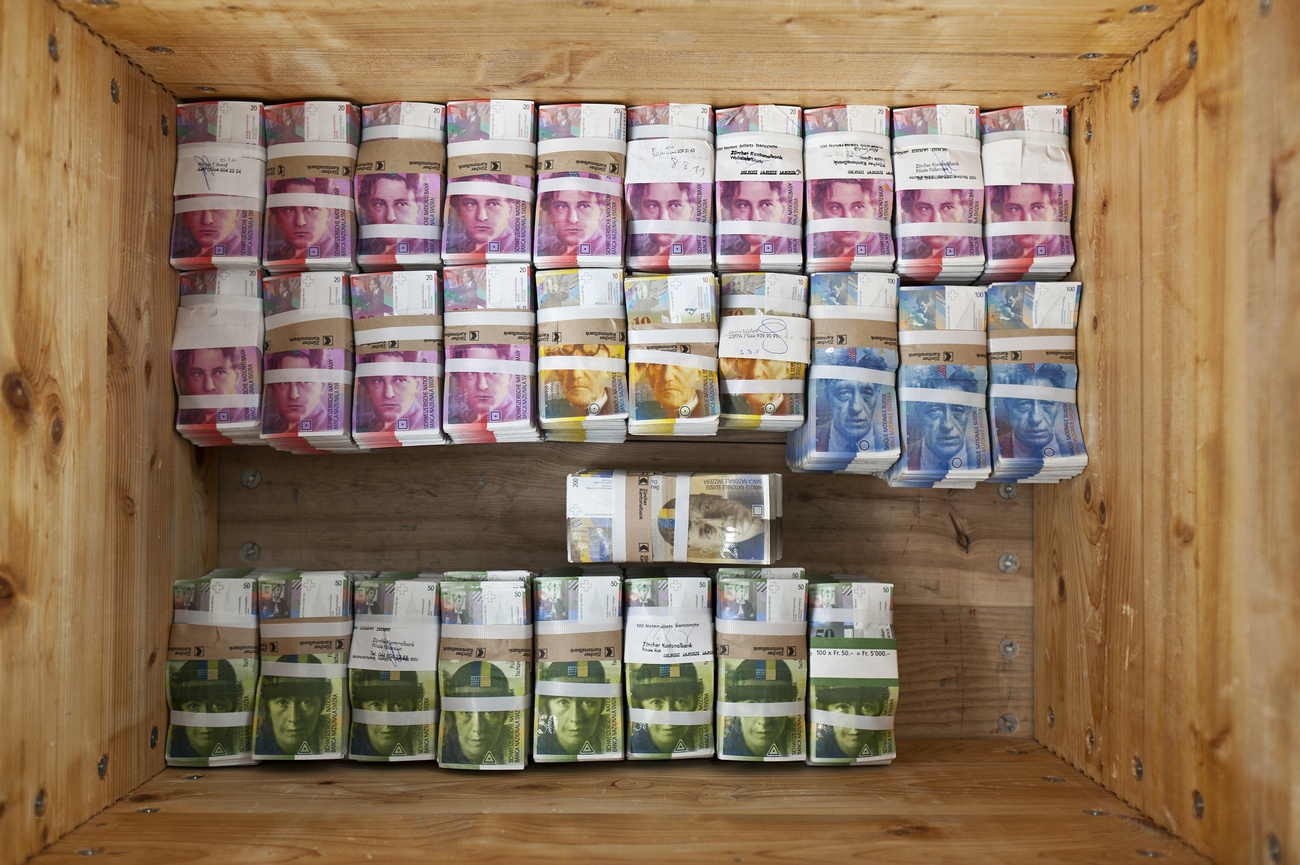
Switzerland keeps profits derived from foreign bribery. It shouldn’t.
Switzerland should stop this practice. Not only for the sake of its reputation, but also for its own benefit, argues Andrew Dornbierer.
Since the revelations that Swiss banks had served as a favoured hiding spot for former Philippines President Ferdinand Marcos’ corrupt wealth in the 1980s, successive Swiss governments have worked very hard to eradicate the historic perception that Switzerland benefits from international corruption.
Switzerland has openly and repeatedly set itself high ethical standards in this context. The public messageExternal link for the last three decades has been clear: the retention of assets that originate from the corruption of foreign officials is immoralExternal link and that Switzerland does not want corrupt moneyExternal link. To formalise this message at an international level, it ratified several key anti-corruption focused treaties anchored to the United Nations, the OECD and the Council of Europe. At the domestic level, the governing Federal Council even introduced an “Anti-Corruption Strategy” for the first time in 2021.
Commendably, Switzerland has reinforced its self-imposed standards through tangible results. It has forged a strong record in identifying and returning proceeds of corruption that have found their way into the Swiss financial system. To date, Switzerland has seized and repatriated more than $2 billionExternal link in corrupt proceeds linked to foreign officials – an impressive amount.

More
With US in retreat, can Switzerland maintain fight against kleptocracy?
It would be wrong however, to argue that Switzerland’s job is complete. Despite these efforts and advancements, Switzerland is undoubtedly still benefiting substantially from at least one form of international corruption: foreign bribery.
Banking the profits of foreign bribery
Between 2011 and 2024, the Swiss federal authorities concluded 14 foreign bribery cases involving Swiss companies (or international companies operating in Switzerland) through non-trial resolutions.
In these cases, companies such as Glencore External link, Odebrecht External link, KBA NotaSys and Alstom External link were found to have profited enormously from corrupt schemes involving foreign public officials. To close these 14 judicial proceedings, these companies were ordered to hand over an eyewatering total of about CHF730 million (CHF586,128,983 and $179,694819) in illicit gains to the Swiss treasury.

More
Corruption study: one in three Swiss companies pays bribes abroad
On the surface, this certainly seems like a just result. Companies were caught for wrongdoing and the forced transfer of their illicit profits to the Swiss government ensured that these companies didn’t benefit from their crimes. This simple analysis, however, forgets one critical thing: these profits were not obtained through corrupt acts predominantly affecting Switzerland but through acts that largely damaged low- or middle-income states such as the Democratic Republic of Congo, Equatorial Guinea, Morocco and Brazil. In some cases, this included clearly tangible harm (for example the sale of state assets at an undervalued price). In all cases, this certainly included intangible harm to the state (and its population) such as the erosion of trust in public institutions, the discouragement of foreign investment, and the undermining of economic development.
Consequently, by retaining these funds, the Swiss treasury is still vulnerable to criticisms that it is substantially benefiting from acts of international corruption committed by Swiss-linked companies, and additionally, that this benefit is being enjoyed to the detriment of foreign states.
Why is Switzerland keeping this money?
As previously mentioned, Switzerland has a strong record of sharing or returning the profits of other forms of international corruption. For example, in the last three years, it has transferred $444 million in corrupt proceeds to Uzbekistan through a specially created United Nation’s fund to directly benefit the Uzbek population.
Unfortunately, the key law that would enable Switzerland to share the profits of foreign bribery, the Federal Act on the Division of Forfeited Assets, includes a limitation that unintentionally prevents its application to these types of cases. Specifically, the law only allows the government to negotiate agreements with foreign states for the sharing of criminal proceeds if the relevant state provided assistance to Switzerland during judicial proceedings. This limitation is understandable and is designed to encourage international cooperation. In foreign bribery cases, however, cooperation from other countries is rarely sought or required by Swiss authorities. In practice, these cases are predominantly resolved through non-trial resolutions and the companies themselves cooperate directly with law enforcement agencies during the proceedings and provide the requisite information. Consequently, states harmed by foreign bribery are rarely given the opportunity to assist these cases – and by default – Switzerland is not authorised to engage with them post-proceedings to negotiate a sharing agreement.

More
Gold traceability, the weak link in Swiss watchmaking
On top of this, judicial avenues to compensate damages are not readily available. Particularly if the foreign bribery itself hasn’t resulted in any clearly calculable damage to a state but has only caused intangible damage to a less clearly defined victim: the population of a state.
Consequently, Switzerland retains these profits as there are essentially no clearly defined legal avenues through which they can relinquish their control over them – at least in a way that rectifies the harms caused by these crimes.
What needs to be done?
As a baseline, Switzerland should embark on a policy to ensure that it no longer retains the profits of foreign bribery cases, even by default.
Instead, it should take legislative action to ensure that these funds are redirected to address the harms caused to foreign states in these cases. Either through agreements designed to directly address tangible harm or through mechanisms that ensure that the funds can be used to benefit the broader victims of these acts – the populations of the states most affected by them. Ideally, any such agreement should include the financing of initiatives that look to prevent and deter any future harm to that state through future acts of foreign bribery or which generally aim to reinforce the rule of law.
This legislative action could include amendments to the abovementioned law that removes the cooperation limitation specifically for foreign bribery cases. Alternatively, it could include the creation of a new law that authorises the Swiss government to enter sharing agreements in these types of cases.
Of course, negotiating sharing agreements will not always be possible or feasible in every case. Political circumstances may create challenges. The same corrupt elements involved in the original illicit acts may even continue to exist in certain governments. In such cases, Switzerland should still not retain the relevant illicit profits. Instead, to ensure that the profits of foreign bribery in such cases can also be repurposed, Switzerland should take legislative action to create a general “anti-corruption fund” into which the illicit profits in such cases could be redirected. This fund could then oversee the repurposing of these amounts towards initiatives that target foreign bribery and corruption globally. Alternatively, it could also act as a support fund for any victims of other cases of foreign bribery who require financial assistance to address harm caused or to make judicial claims for compensation.
It should be highlighted that Switzerland itself will also benefit from these actions. At the domestic level, it will likely result in more business for law-abiding Swiss companies.
A study by the University of the Applied Sciences of the Grisons and Transparency International found that almost a quarter of Swiss companies operating abroad believe they are losing business to corrupt competitors. By repurposing illicit profits from these cases to initiatives that prevent and deter future foreign bribery in vulnerable states, it will also create a fairer playing field in which Swiss companies can compete for business. At the international level, it will cement Switzerland’s status as a global anti-corruption leader.
Switzerland has long sought to rid itself of the perception that it benefits from international corruption and it has taken significant steps to achieve this. However, there is still more that can be done. By taking legislative action to ensure that it can also redirect and repurpose the proceeds of foreign bribery cases, Switzerland will be resoundingly reinforcing its own message that it does not want corrupt money.

More
What role does money play in Swiss politics?
Edited by Benjamin von Wyl/ac
Andrew Dornbierer recently published a policy brief on foreign briberyExternal link.
The views expressed by the author do not necessarily reflect those of Swissinfo.

In compliance with the JTI standards
More: SWI swissinfo.ch certified by the Journalism Trust Initiative
































You can find an overview of ongoing debates with our journalists here . Please join us!
If you want to start a conversation about a topic raised in this article or want to report factual errors, email us at english@swissinfo.ch.